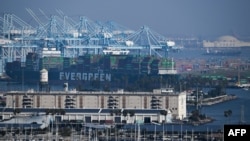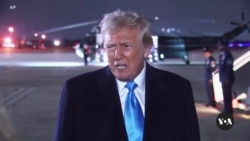U.S. President Donald Trump and Chinese leader Xi Jinping are set soon to hold a high-stakes phone call on the tit-for-tat tariffs each has imposed on the other country’s exports.
Trump’s new 10% tariff on Chinese goods took effect at midnight Monday, with China quickly announcing it would impose 15% tariffs on U.S. coal and liquified natural gas, as well as 10% tariffs on crude oil, agricultural machinery and some automobiles.
Trump on Monday retreated for a month from imposing 25% tariffs on most exports from the United States’ other top-three trading partners, Mexico and Canada. Mexican President Claudia Sheinbaum and Canadian Prime Minister Justin Trudeau agreed to increase efforts to curb the flow of fentanyl, the deadly opioid that has killed several hundred thousand Americans over recent years.
Trump said he imposed the tariff on Chinese exports to pressure China to take action to prevent fentanyl smuggling into the U.S., which identified China as a major source of the precursor chemicals used by Mexican drug cartels to manufacture fentanyl.
China said it has taken steps to crack down on the industry and other illicit drug trade.
"China hopefully is going to stop sending us fentanyl, and if they're not, the tariffs are going to go substantially higher," Trump said.
White House press secretary Karoline Leavitt said Trump’s call with Xi “is being scheduled and will happen very soon.”
The U.S. and China, the world’s two biggest economies, engaged in an escalating trade war in 2018 during Trump’s first term in office when he repeatedly raised tariffs on Chinese goods, and Beijing responded each time.
This time, China is much better prepared, analysts say. The country announced numerous measures that go beyond tariffs and cut across different sectors of the U.S. economy. China is also more wary of upsetting its own fragile and heavily trade-dependent economy.
China's tariffs and other moves
China’s State Council Tariff Commission said in a statement announcing its levy on U.S. products, "The U.S.'s unilateral tariff increase seriously violates the rules of the World Trade Organization. It is not only unhelpful in solving its own problems, but also damages normal economic and trade cooperation between China and the U.S."
But the impact on U.S. exports could be limited. Although the U.S. worldwide is the biggest exporter of liquid natural gas, it does not export much to China. In 2023, the U.S. exported 173,247 million cubic feet of LNG to China, about 2.3% of its total natural gas exports, according to the U.S. Energy Information Administration.
China imported fewer than 110,000 vehicles from the U.S. last year, although auto market analyst Lei Xing told The Associated Press that the tariffs could be painful for General Motors, which is adding the Chevrolet Tahoe and GMC Yukon to its China lineup, and for Ford, which exports the Mustang and F-150 Raptor pickup.
In addition to the tariff hike, China announced export controls on several elements critical to the production of modern high-tech products.
They include tungsten, tellurium, bismuth, molybdenum and indium, many of which are designated as critical minerals by the U.S. Geological Survey, meaning they are essential to U.S. economic or national security that have supply chains vulnerable to disruption. The export controls are in addition to ones China placed in December on such key elements as gallium.
The Commerce Ministry also placed two American companies on an unreliable entities list: PVH Group, which owns clothing companies Calvin Klein and Tommy Hilfiger, and Illumina, which is a biotechnology company with offices in China.
The listing could bar them from engaging in China-related import or export activities and from making new investments in the country. The ministry said its investigations show the two U.S. companies have "disrupted normal business with Chinese companies, taken discriminatory measures against Chinese companies and severely harmed the legitimate rights of Chinese companies."
Beijing began investigating PVH Group in September 2024 over what it described as "improper Xinjiang-related behavior" after the company allegedly boycotted the use of Xinjiang cotton.
Illumina competes with the Chinese biotech firm BGI in gene-sequencing.
In a statement, Illumina said it complies with regulations wherever it operates.
"We are assessing this announcement with the goal of finding a positive resolution," the company said.
Mexico and Canada tariffs
On Monday, Sheinbaum said she would dispatch 10,000 National Guard troops to the U.S.-Mexico border to try to curb the flow of drugs into the United States.
"Mexico will reinforce the northern border … to stop drug trafficking from Mexico to the United States, in particular fentanyl," she posted on X after talking with Trump. "The United States commits to work to stop the trafficking of high-powered weapons to Mexico."
Trudeau said Canada would deploy new technology and personnel along its southern border with the United States to stop the flow of fentanyl.
"I just had a good call with President Trump," Trudeau said on X. "Proposed tariffs will be paused for at least 30 days while we work together."
Effects on US consumers
Trump acknowledged Sunday that the new tariffs on the three biggest U.S. trading partners could hit inflation-weary Americans with higher prices for groceries, gasoline, cars and other consumer goods but said the higher tariffs would be “worth the price” to bolster U.S. interests.
U.S. consumers could face higher prices because companies that pay the tariffs to the federal government to import goods from other countries often pass on at least part, if not all, of their higher costs to consumers, rather than absorb the extra expenses themselves.
Some material in this report came from The Associated Press, Agence France-Presse and Reuters.















